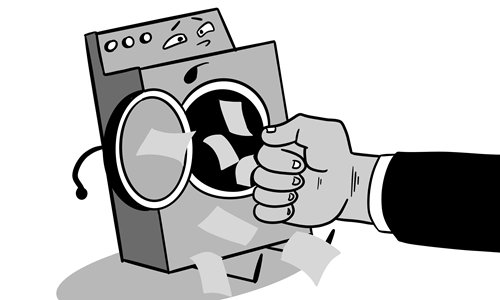HOME >> BUSINESS
China will not play favorites between India and Pakistan over terror financing decision
By Zhou Qing Source:Global Times Published: 2019/10/16 20:43:40

Illustration: Luo Xuan/GT
How many shades of gray fits India's fantasy? It seems that India makes too much fuss about whether Pakistan will be moved to the "dark gray" list from the "gray" list of the Financial Action Task Force (FATF) while China is presiding over the Paris-based terrorist financing watchdog. India should view the upcoming FATF decision with more rationality and China's role should not be overestimated in this case. Fundamentally, eradicating terrorism needs the joint efforts of both India and Pakistan.
India has been eyeing what China will do with its "iron brother" Pakistan at the FATF meeting this week. The meeting, participated in by over 200 jurisdictions and aiming at tackling money laundering and terrorist financing, will wrap up on Friday and is expected to announce its final decisions. Indian media have already hyped up the possibility of Pakistan being put on the "dark gray" list or even the blacklist.
News reports have dropped hints that China may favor Pakistan. Some even try to pressure China. According to the Indo-Asian News Service (IANS), the FATF's credibility will be at stake if the China-headed organization doesn't downgrade Pakistan.
Before drawing connections, there must be solid evidence. The FATF has its own standards and evaluation processes no matter how hard some countries are advocating for the inclusion of Pakistan on the blacklist. Also, linking China to the FATF final decision is apparently an overstretch. Trying to paint a collective decision-making process as a result dominated by China's will and preference is narrow-minded and irrational by itself.
This is not the first time India tries to pin the blame on China for backing Pakistan on terrorism related situations. China has nothing to hide. The country currently holds the presidency of the FATF, but it does not mean it will show greater leniency to countries that share closer ties with China. In fact, China accepted the UN's designation of Masood Azhar, chief of Jaish-e-Mohammad, as a global terrorist in May. India, instead of welcoming the move, interpreted it as being China forced by international pressure.
India has held this outlandish victim mind-set that China will act in favor of Pakistan and against India no matter what China does. The reason boils down to India not being willing to show trust. India does not trust that Pakistan is a good partner to work with to combat terrorism. It also does not trust China's goodwill in helping India and Pakistan in anti-terrorism efforts.
China already supported the UN's resolution on blacklisting Masood. There is no doubt that the country will agree on and accept the appropriate decisions of international organizations.
Meanwhile, it is also worth noting that combating terrorism is a complicated topic. Pakistan has come a long way in its fight against terrorism. Its efforts cannot be overlooked. Moreover, due to the complexities of ethnicity, religion and territorial disputes in the region, it is important not to allow terrorist attacks add more antagonization between the two countries.
Mutual understanding and cooperation instead of a victim mind-set help to deal with terrorism. India has to realize that it cannot fight terrorism alone without Pakistan on board. China is willing to offer platforms for the two countries to explore joint anti-terrorism measures if India can let down its guard. China would sincerely like to see the two countries join hands to address terrorism, which will be in accordance with China's interests in tackling terrorism in its surrounding areas.
China and Pakistan share an all-weather friendship and China-India ties are warming up after the informal meeting last week between the leaders of the two Asian giants. Against the backdrop of a looming global recession, Asian countries should stick together to combat terrorism together and maintain a peaceful regional environment instead of over-dramatizing situations.
The author is a reporter with the Global Times. bizopinion@globaltimes.com.cn
Posted in: EXPERT ASSESSMENT